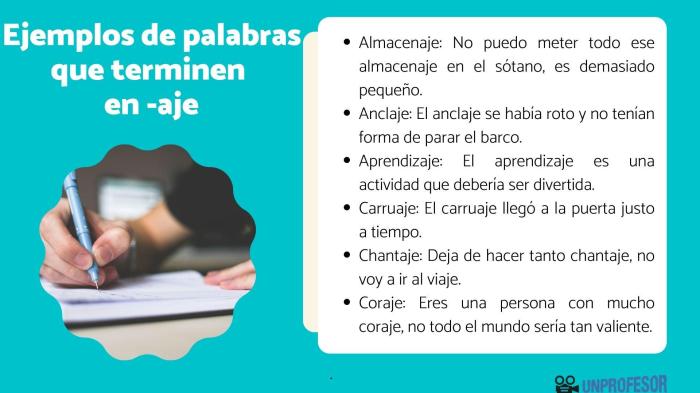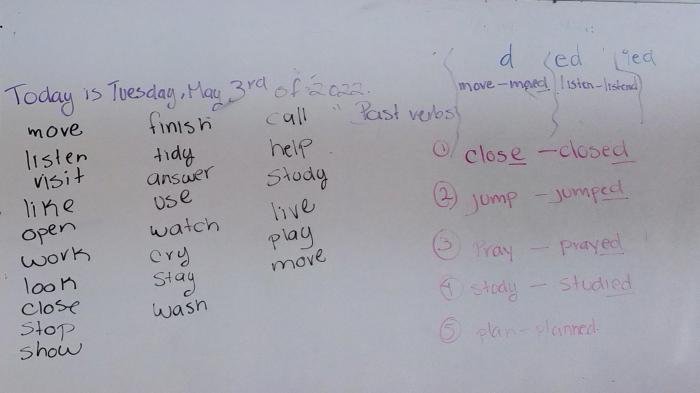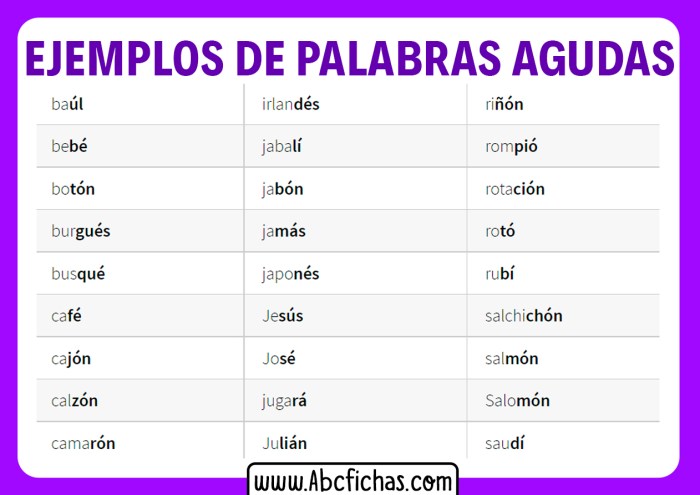Embark on a captivating journey into the realm of “palabras que terminen en ia,” where words dance with elegance and unveil hidden meanings. From their enigmatic origins to their versatile grammatical functions, these words paint a vibrant tapestry of language.
Delve into the rich semantic landscape of “ia” endings, discovering subtle nuances and intriguing connections that shape their expressive power. Prepare to be enchanted as we explore the literary brilliance of authors who have mastered the art of weaving these words into unforgettable prose.
Meaning and Definition

Words ending in “-ia” typically refer to concepts, qualities, or states of being. They often have a Latin or Greek origin, reflecting their widespread use in academic and scientific contexts.
Examples of words ending in “-ia” include “academia,” “nostalgia,” and “euphoria.”
Etymology and Origin
The “-ia” suffix is derived from the Greek “-eia,” which was used to form abstract nouns. In Latin, the suffix became “-ia,” and it was adopted into English through the borrowing of Latin words.
Grammatical Function

Words ending in “ia” can serve various grammatical functions in the English language. They can be used as nouns, adjectives, or verbs, each with its unique set of rules and exceptions.
Nouns
Words ending in “ia” that function as nouns typically refer to abstract concepts, qualities, or actions. Examples include “euphoria,” “nostalgia,” and “malaria.”
Adjectives
Words ending in “ia” that function as adjectives describe nouns and can express a wide range of qualities. Examples include “euphoric,” “nostalgic,” and “malarial.”
Verbs
Words ending in “ia” that function as verbs typically denote actions or states of being. Examples include “eulogize,” “initiate,” and “mediate.”
Semantic Analysis

Words ending in “-ia” often share certain semantic characteristics. They frequently convey concepts related to conditions, qualities, states of being, or abstract ideas. This suffix imparts a sense of abstractness, immateriality, or intangibility to the words it modifies.
Similar Meanings
- Agonia, agonia, and agoniaall refer to states of extreme pain or suffering.
- Amnesia, hipoamnesia, and anomiaall involve memory loss or impairment.
- Euforia, mania, and melancoliadescribe different emotional states.
Nuances and Differences
While words ending in “-ia” may share similar meanings, they often exhibit subtle nuances and differences in their semantic content.
Learning about palabras que terminen en ia is a great way to expand your vocabulary. If you’re looking for a challenge, try taking the world history unit 1 exam . It’s a great way to test your knowledge of the subject and learn more about the history of the world.
Once you’ve mastered palabras que terminen en ia, you’ll be well on your way to becoming a Spanish language pro.
- Agoniarefers to intense physical pain, while agoniadenotes mental anguish or emotional torment.
- Amnesiainvolves a complete loss of memory, while hipoamnesiaindicates a partial loss or impairment.
- Euforiadescribes a state of intense joy or excitement, whereas maniaimplies a more extreme and potentially pathological form of elation.
Understanding these nuances is crucial for precise and effective communication, as choosing the appropriate word ending in “-ia” can convey specific and distinct meanings.
Usage in Literature and Language

Words ending in “ia” have a rich history in literature, contributing to the stylistic and thematic depth of various works. Their presence enhances the sensory and emotional impact of the writing, adding a distinct flavor to the narrative.
Authors such as Edgar Allan Poe, William Faulkner, and Virginia Woolf have frequently employed words ending in “ia” to create evocative atmospheres and convey complex emotions. These words often carry a sense of mystery, melancholy, or ethereal beauty, contributing to the overall mood and tone of the literary piece.
Stylistic Effects
Words ending in “ia” often possess a musical quality, lending a rhythmic flow to the writing. Their vowel-heavy endings create a lingering resonance that enhances the sensory experience for the reader. The use of these words can also evoke a sense of nostalgia or timelessness, as they are often associated with older forms of language and literature.
Literary Effects, Palabras que terminen en ia
Beyond their stylistic impact, words ending in “ia” can also serve important literary functions. They can create a sense of mystery and intrigue, hinting at hidden meanings or unspoken truths. Additionally, they can convey a sense of awe or wonder, particularly when used to describe natural phenomena or otherworldly experiences.
Examples in Literature
- In Edgar Allan Poe’s “The Fall of the House of Usher,” the use of words like “melancholia” and “phantasmagoria” contributes to the eerie and haunting atmosphere of the story.
- William Faulkner’s “As I Lay Dying” features numerous words ending in “ia,” such as “agony” and “anguish,” which amplify the emotional turmoil and psychological struggles of the characters.
- Virginia Woolf’s “To the Lighthouse” employs words like “reverie” and “epiphany” to capture the fleeting moments of introspection and revelation experienced by the characters.
The use of words ending in “ia” in literature is a testament to their versatility and evocative power. They enhance the sensory and emotional impact of the writing, contributing to the overall stylistic and thematic richness of the literary work.
Comparative Analysis: Palabras Que Terminen En Ia
Words ending in “ia” share certain characteristics with other word endings, but also exhibit unique features. Understanding these similarities and differences can help writers and speakers use words ending in “ia” effectively in various contexts.
Similarities with Other Word Endings
- Nouns:Words ending in “ia” are often nouns, similar to words ending in “-tion” (e.g., “education”), “-ment” (e.g., “development”), and “-ity” (e.g., “quality”).
- Abstract Concepts:Words ending in “ia” frequently represent abstract concepts, like words ending in “-ness” (e.g., “happiness”) and “-ity” (e.g., “sincerity”).
Differences from Other Word Endings
- Specificity:Words ending in “ia” often convey a specific or technical meaning, unlike words ending in “-tion” or “-ment” which can have broader applications.
- Formal Tone:Words ending in “ia” generally have a more formal tone compared to words ending in “-ness” or “-ity,” making them suitable for academic or professional writing.
Advantages and Disadvantages of Using Words Ending in “ia”
Advantages:
- Precision:Words ending in “ia” provide a precise and specific way to express abstract concepts.
- Formality:They lend a formal and academic tone to writing, enhancing credibility and professionalism.
Disadvantages:
- Complexity:Words ending in “ia” can be complex and challenging to understand for non-native speakers or readers with limited vocabulary.
- Overuse:Excessive use of words ending in “ia” can lead to monotony and make writing less engaging.
Q&A
What is the grammatical function of words ending in “ia”?
Words ending in “ia” can serve various grammatical functions, including nouns (e.g., “academia”), adjectives (e.g., “genial”), and verbs (e.g., “estudiar”).
How do words ending in “ia” contribute to literary works?
Authors often employ words ending in “ia” to create specific stylistic effects, such as enhancing rhythm, evoking emotions, and adding a touch of formality or elegance to their writing.
